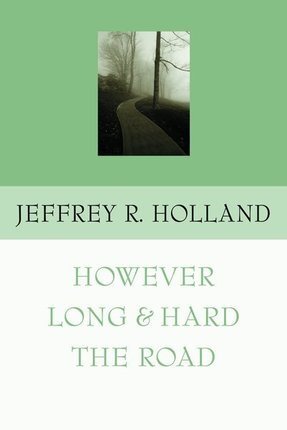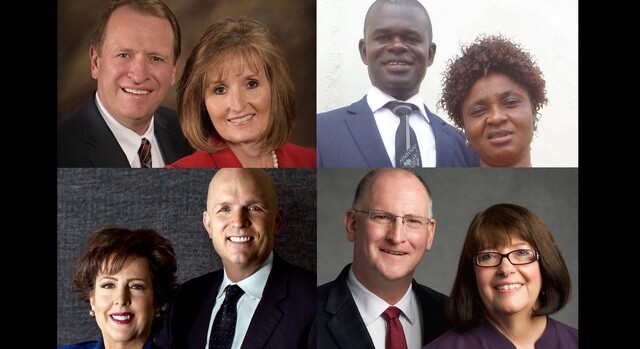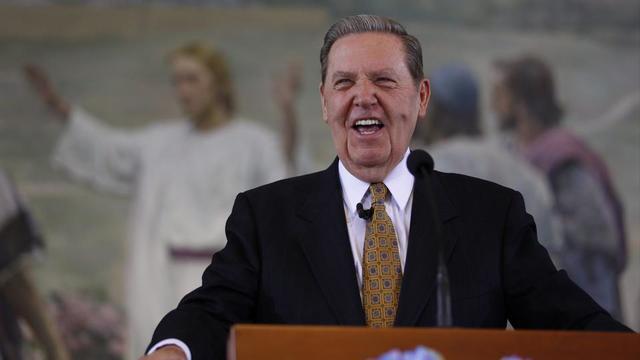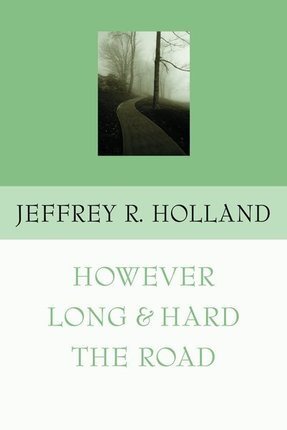The following is an excerpt from However Long and Hard the Road.
I am not much of a joiner. I didn't belong to many clubs or social units at school, and more recently I have been about as reluctant in my professional affiliations. Some of my assignments have required public participation, but in many other ways I am a private person. My sentiments are not quite those of Robert Frost, but they are close. To a group of young people he once said: "Don't join too many gangs. Join your family and join the United States and drop off at a college on the way if you have time, but don't join a lot of gangs."
In addition to joining my family and the United States and dropping by a college because I had time, I have made one other commitment more important than all the rest. Indeed, it is the commitment that gives meaning to all of my other associations, personal or professional, public or private. I am a member of The Church of Jesus Christ of Latter-day Saints—baptized, confirmed, ordained, endowed. A veritable pacifist when it comes to social guilds or luncheon clubs, I turn into something of a militant on the subject of the only true and living church on the face of the earth. As an ancient prophet declared, I have wanted above any other fraternal relationship to "come into the fold of God, and to be called his people" (Mosiah 18:8).
A Member of Christ's Church
What does it mean to belong, to be a member of Christ's church and be "called unto the fellowship of . . . Jesus Christ our Lord" (1 Corinthians 1:9)? Obviously much of the joy and most of the meaning is yet to be fully realized. Surely it will be after death and beyond the veil that, more mature and enlightened, we will see—because we will be shown—the eternal implications of our earthly covenants. But what of our experience now? What does membership mean to us today, while we yet live and exert our faith and confront our problems in this world? What do we find while we wait, looking toward a celestial reward that does not come in mortality?
Let me share a personal response to those questions with two caveats: First, no single statement can do justice to what any of us feel about our church membership; a barrel of books could not do it, and certainly the little cup I am offering will not contain it. Second, the most personal of responses—and consequently the most persuasive ones—cannot be shared. Some are too sacred and others simply ineffable. In either case, all that can be put in the briefest of print is, as Ammon said, "the smallest part" of what we feel (Alma 26:16).
Obviously part of the meaning of being a "member" is in that choice of language itself, coined originally by the apostle Paul who knew so much about coming to Christ: "As the body is one, and hath many members. . . . so also is Christ. . . . For the body is not one member but many. . . . And the eye cannot say unto the hand, I have no need of thee; nor again the head to the feet, I have no need of you. . . . Now ye are the body of Christ, and members in particular" (1 Corinthians 12:12, 14, 21, 27).
It is an immensely satisfying thing to be needed in the body of Christ. Whether I function as an eye or an arm is irrelevant; the fact is, I am needed in this most majestic organism, and the body is imperfect without me. A popular singer made a small fortune reminding us that "people who need people are the luckiest people in the world." In The Church of Jesus Christ of Latter-day Saints, the restored ecclesiastical body of Christ, people do need people and everyone is welcomed. This includes (in Paul's assertion) not only the attractive, talented, "comely" members, but also those of us who seem to have fewer gifts and face greater challenges, those who receive less honor and attention. In the Church of Jesus Christ "more abundant honor" is given to these. Every member matters, and the less favored member most of all (See 1 Corinthians 12:23-24).
"Often in our most difficult times the only thing we can do is endure. We may have no idea what the final cost in suffering or sacrifice may be, but we can vow never to give up. In doing so we will learn that there is no worthy task so great nor burden so heavy that will not yield to our perseverance. We can make it. . . however long and hard the road." So writes Elder Jeffrey R. Holland in this beautiful book that teaches how to overcome temptations and feelings of inadequacy and obtain forgiveness and strength.
We Belong
For most of the first two decades of my life I attended one ward of the Church—the old St. George Fifth Ward. Now, after two more decades, it is a moving memory for me to sit all alone in that darkened red sandstone tabernacle so artistically crafted by loving pioneer hands. That is the meetinghouse of the "members" where I was confirmed into the "body of Christ." That is where I went to Primary and first passed the sacrament as a nervous and uncertain deacon. That is the pulpit where I gave my first talk and the podium where I shook the hand of President George Albert Smith the year I was baptized. It was there that I sat spellbound in that ornate balcony as Elder Matthew Cowley brought the audience to both laughter and tears on a visit to our stake conference. I was hardly an eye or an ear then; more like a lash or a lobe, I suppose. But I was an irreplaceable member of the body of Christ.
Since then I have lived and loved and been loved in a dozen other wards of the Church, and the blessings of church assignments have taken me to many dozen more. But always and everywhere it is the same, whether in an open-air, hand-hewn South Pacific fale or the striking Hyde Park Chapel on Exhibition Road in London. Wherever I have attended church at home or abroad, it has evoked the same meaning of that beautiful old tabernacle where I was first part of the congregation. . . .
In the aftermath of the Teton Dam disaster that swept floodwaters through the Upper Snake River Valley in southeastern Idaho, many of our friends there reported very inspiring personal experiences. Combined, they read something like this:
"We didn't cry when we saw our home ripped away from its foundation. We didn't cry when we thought of the photo albums and ordination certificates and irreplaceable personal treasures that would be gone forever. We didn't cry as we fought for everything we could save and repeatedly counted heads through the neighborhood to make sure lives were safe.
"But later on, when we looked up and saw out of the night those buses and vans and jeeps and pickups rumbling toward us like an armored division of a heavenly army, we sat down and sobbed. Old people and young people and artisans and laborers, 45,000 of them. They came from everywhere for hundreds of miles—over some roads still uncleared and unsafe. They tumbled out of those buses with shovels and buckets and hammers and food. 'It looks like you could use a hand,' they would say, laughing to keep back the tears at what they saw before them. Then shoulder to shoulder with friends we had never seen before and may never see again, we cleaned and sang and held each other up.
"We cried then and then only—not about the flood, but about what happened after it. We can't discuss it now without the memory of a hymn ringing in our ears:
- When through the deep waters I call thee to go,
- The rivers of sorrow shall not thee o'erflow,
- For I will be with thee thy troubles to bless,
- And sanctify to thee thy deepest distress.
- The soul that on Jesus hath leaned for repose
- I will not, I cannot, desert to his foes,
- That soul, though all hell should endeavor to shake
- I'll never, no never, no never forsake.
- —Hymns, no. 66
It is a soul-stirring reassurance to belong, to be part of the most cohesive extended-family association in all eternity. We speak of sealing ourselves to one another, and well we should. The Prophet Joseph Smith said we might more plainly refer to it as welding (D&C 128:18). The bonding and brotherhood are unmistaken. Setting aside for a time the heavenly host we hope one day to enjoy, I still choose the Church of Jesus Christ to fill my need to be needed—here and now, as well as there and then. When public problems or private heartaches come—as surely they do come—I will be most fortunate if in that hour I find myself in the company of Latter-day Saints.
Finding Purpose
What emerges from that special association—from feelings of safety and peace, of belonging and happiness and heavenly help—is an inexorable sense of purpose and direction. Some have felt the fears and frustrations of life more than others, but all of us feel them a little, and in such times we need the gospel compass to remind us who we are and where we must go.
Blaise Pascal, probably France's most notable child prodigy of the last three centuries, reflects in an extreme way what many men have felt when unaided by gospel truths. He wrote of his very gifted life, "When I see the blindness and wretchedness of man, when I regard the whole silent universe and man without light, left to himself, and, as it were, lost in this corner of the universe, without knowing who has put him there, what he has come to do, what will become of him at death, and incapable of all knowledge, I become terrified, like a man who should be carried in his sleep to a dreadful desert island and should awake without knowing where he is and without means of escape" (Pensees, XI, 693).
Contrast that psychic turbulence with the serenity we saw while standing with our childhood playmates as they laid their first-born child in the grave. This beautiful little thirteen-year-old girl, born just ninety days after our own first child, had fallen victim to Cockayne's syndrome a half dozen years earlier. There is no way to adequately describe the deterioration of that little body now gone. Nor is there any way to tell the patience and the pain of those parents as they carried legs that could not walk and finally fed with an eye-dropper a mouth that could not swallow.
But there was no existential anguish rending the air. Standing quietly—no, peacefully—at the casket with this little family now temporarily lessened by Patti's leaving were her Beehive class, her Sunday School teacher, and a favorite teenage home teacher. There also were the two with whom her father had served in the bishopric. Her mother's Relief Society associates dried their tears and slipped away to prepare a family luncheon. Fellow members in the body of Christ remembered, "And whether one member suffer, all the members suffer with it" (1 Corinthians 12:26). . . .
That hopeful, trusting facing of the future is part of what it means to be a Latter-day Saint. It is part of knowing by divine revelation the answers (even in our childhood) to life's greatest questions. One writer speaking for almost all others declared that "the whole interest of [philosophy] . . . is centered in the three following questions: 1. What can I know? 2. What ought I to do? 3. What may I hope?" (Immanuel Kant, Critique of Pure Reason). Think of those fundamental and ancient issues, think of Pascalean terror, and then stand again at that little child's grave.
We have no way to measure such a conviction, but I am confident that tiny girl knew more of the eternal meaning of her experience than most of the adult population on this planet would have known in similar circumstances. And why not? Why shouldn't it intensify our sense of identity and self-respect and hope for the future to know that we are the spiritual offspring of God, that he is literally our Father in heaven, and that we are by lineal descent his sons and daughters, created in his own image? What encouragement should it give us to know that we lived with him before memory was revoked and that we will be with him again when all things, including memory, are fully restored? That one abiding and ineluctable truth does more to answer the philosophical questions of six millennia than any other single assertion under heaven. Indeed, man is only slightly under heaven, "a little lower than the angels" (Psalm 8:5), and never out of divine reach. . . .
What we "really are" is embryonic gods, and surely this world is trying to make us forget that, make us pursue something else. . . .
We must remember, in a world where some still go hungry, that men, women, and children can starve from a lack of self-knowledge as much as they can from a lack of bread. That is why, when Jesus invited his disciples to partake of the emblems of his body and blood, they were filled (3 Nephi 18:4-5)—filled with the spirit of heaven, filled with the spirit of hope, filled with more certain knowledge of who they really were: "heirs of God, and joint heirs with Christ." That same spirit bears witness to us yet that we are the children of God (Romans 8:16-17). . . .
There are a thousand reasons for and ten thousand joys in belonging to the true church. Surely no one can fully say—perhaps not even begin to say—what that covenantal relationship means to him or her. Suffice it to say that those who believe with me that The Church of Jesus Christ of Latter-day Saints is indeed the restoration of pure Christianity in the fullness of time will understand the meaning of membership expressed by an early seeker of the truth who fell during the Roman persecutions of the third century. Before he died, Cyprian wrote to his friend Donatus: "This seems a cheerful world, Donatus, when I view it from this fair garden under the shadow of these vines. But if I climbed some great mountain and looked over the wide lands, you know very well what I would see—brigands on the high roads, pirates on the seas, in the amphitheaters men murdered to please applauding crowds; under all roofs misery and selfishness. It is really a bad world, yet in the midst of it I have found a quiet and holy people. They have discovered a joy which is a thousand times better than any pleasure of this sinful life. They are despised and persecuted, but they care not. They have overcome the world. These people, Donatus, are the Christians and I am one of them" (Quoted by Marion D. Hanks, "Freedom and Responsibility," BYU Speeches of the Year, May 28, 1964, p. 11).
Following a long night of darkness, "these people" are the Latter-day Saints—and I am one of them. The meaning of my life is inextricably linked with my membership in that body. There my family and friends have found life, and found it "more abundantly."
Lead image from Mormon Newsroom
"Often in our most difficult times the only thing we can do is endure. We may have no idea what the final cost in suffering or sacrifice may be, but we can vow never to give up. In doing so we will learn that there is no worthy task so great nor burden so heavy that will not yield to our perseverance. We can make it. . . however long and hard the road." So writes Elder Jeffrey R. Holland in this beautiful book that teaches how to overcome temptations and feelings of inadequacy and obtain forgiveness and strength.




